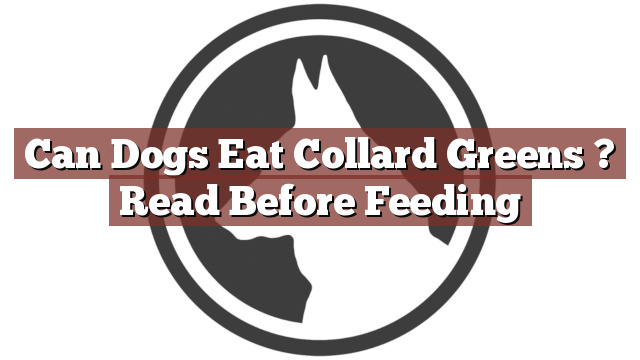Understanding Your Dog’s Dietary Needs
As responsible pet owners, it is essential to understand our dog’s dietary needs to ensure their overall health and well-being. While dogs are primarily carnivorous, they can also benefit from certain fruits and vegetables in their diet. However, it is crucial to be aware of which foods are safe for dogs and which ones should be avoided. One common food that dog owners often wonder about is collard greens. Can dogs eat collard greens? Let’s find out!
Can Dogs Eat Collard Greens? Read Before Feeding
Can dogs eat collard greens? The answer is yes, dogs can eat collard greens in moderation. Collard greens are a nutritious leafy green vegetable that can provide several health benefits to your furry friend. However, it is important to prepare and serve them properly to avoid any potential digestive issues.
Collard greens are packed with essential vitamins and minerals like vitamin K, vitamin A, vitamin C, and calcium. These nutrients can support your dog’s immune system, promote healthy vision, and contribute to strong bones and teeth. Additionally, collard greens are high in dietary fiber, which can aid in digestion and regulate bowel movements.
Pros and Cons of Feeding Collard Greens to Dogs
Before incorporating collard greens into your dog’s diet, it is crucial to consider both the pros and cons of feeding this vegetable to your furry friend.
Pros:
- Nutritional Benefits: Collard greens are rich in vitamins and minerals that can enhance your dog’s overall health.
- Fiber Content: The high fiber content in collard greens can help regulate your dog’s digestive system.
- Low in Calories: Collard greens are low in calories, making them a great addition to your dog’s diet if they need to lose or maintain weight.
Cons:
- Oxalates: Collard greens contain oxalates, which can interfere with calcium absorption and potentially lead to kidney or bladder stones in dogs prone to these conditions.
- Preparation is Key: It is important to prepare the collard greens properly by thoroughly washing them, removing the tough stems, and cooking them before feeding them to your dog. Raw collard greens may be challenging for dogs to digest.
Conclusion: Considerations for Feeding Collard Greens to Your Dog
While collard greens can be a healthy addition to your dog’s diet, there are a few considerations to keep in mind. As with any new food, it is advisable to introduce collard greens gradually and in small quantities to monitor your dog’s reaction. If you notice any signs of digestive upset, such as diarrhea or vomiting, it may be best to avoid feeding collard greens to your dog.
Additionally, if your dog has a history of kidney or bladder issues, it is recommended to consult with your veterinarian before adding collard greens to their diet. They can provide personalized advice based on your dog’s specific health needs.
In conclusion, dogs can eat collard greens in moderation, keeping in mind the proper preparation and potential risks. As responsible pet owners, it is essential to prioritize your dog’s health and consult with a veterinarian if you have any concerns or questions regarding their diet.
Thank you for taking the time to read through our exploration of [page_title]. As every dog lover knows, our furry friends have unique dietary needs and responses, often varying from one canine to another. This is why it's paramount to approach any changes in their diet with caution and knowledge.
Before introducing any new treats or making alterations to your dog's diet based on our insights, it's crucial to consult with a veterinarian about [page_title]. Their expertise ensures that the choices you make are well-suited to your particular pet's health and well-being.
Even seemingly harmless foods can sometimes lead to allergic reactions or digestive issues, which is why monitoring your dog after introducing any new food item is essential.
The content provided here on [page_title] is crafted with care, thorough research, and a genuine love for dogs. Nevertheless, it serves as a general guideline and should not be considered a substitute for professional veterinary advice.
Always prioritize the expert insights of your veterinarian, and remember that the health and happiness of your furry companion come first.
May your journey with your pet continue to be filled with joy, love, and safe culinary adventures. Happy reading, and even happier snacking for your canine friend!

